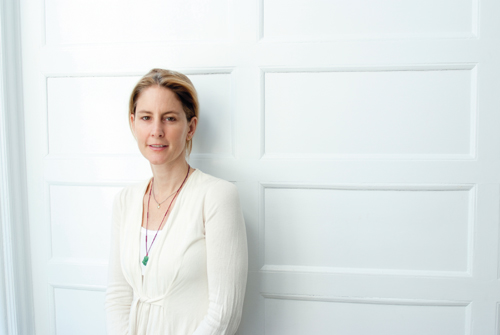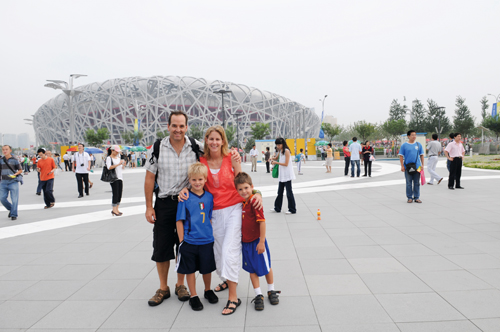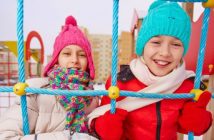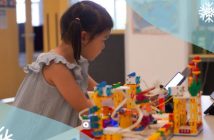
Susan Conley had grand plans for her life in China. She would write a book and her husband Tony would devote himself to his flourishing career. Meanwhile, their boys Aidan (then age 4, now age 8) and Thorne (then age 6, now age 10) would attend school and pick up some Mandarin. Then Conley was diagnosed with breast cancer. Rather than return to the States, Conley stayed in Beijing and wrote an ambitious memoir encompassing both her time in China and her struggle with cancer. The Foremost Good Fortune was recommended in O Magazine’s Reading Room and excerpts have been published in The New York Times. Leading up to her return to Beijing, Conley spoke with beijingkids about her book, her time in China and surviving cancer.
Moving your family to Beijing was gutsy. What convinced you to go?
That would be my husband, Tony. He speaks Mandarin well – he has what I call in the book, “pure tones.” Before I met him, he’d traveled all through rural China as a photographer. His photographs of China’s ethnic minority border regions cover the walls of our house here in the States. So when I married Tony, I knew China was in the cards. When Tony was offered a chance to open a financial software company in Beijing, we jumped at the chance. The time had come.
 In your book, you talk about picking your boys up from their first day of school in Beijing in tears. Did you ever feel like you had made the wrong decision?
In your book, you talk about picking your boys up from their first day of school in Beijing in tears. Did you ever feel like you had made the wrong decision?
I never felt like we’d made the flat out wrong decision. But those first days of a new school can be hard on everyone in the family. We were in deeper than we thought. What I learned was that I had to slow down the pace of things. As long as I was patient, the boys were much more relaxed. The biggest hurdle for my boys was the language. They needed to get some Mandarin under their belts. They also needed to make just one friend. I don’t think the value of children’s friendships in foreign countries can be underestimated.
How did seeing China through the lens of a writer change your experience of it?
I probably looked a little bit longer and harder at our daily life in Beijing than I would have if I wasn’t writing the book. I wanted people who hadn’t been to China to be able to see the changing face of modern Beijing – all its fascinating culture, dazzling architecture, delicious food, confounding traffic and quixotic rules. At times, I bet the writing of the book kept me at a small remove from China, and that is one of the tricky things about writing. But writing the book also demanded that I dive in and learn as much as I could and try to render our small view on China as honestly as I could.
Cancer and China are large topics to tackle in a memoir. How did you blend the two into a coherent story?
Well the trick of a memoir is to take life – which is inherently messy and chaotic – and tame it into something that reads like one, continuous narrative. I found one of the keys to my book when I landed on the metaphor of cancer as a foreign country. Like China, for me cancer became this new place where I didn’t speak the language. The other “Eureka!” moment came when I realized that I could tell the story from the beginning to end in a simple, chronological order. No matter how layered and complicated life my life got, the job of my memoir was to distill that life down and to render it with as much vivid detail and compassion as I could muster.
You were diagnosed with breast cancer while living in Beijing. How did you manage?
All my mothering instincts kicked in – I needed to figure out how I was going to get rid of the cancer because I had these two little boys and I was not going to leave them motherless. I had a great internist at the hospital in Beijing who I kept in very close contact with. I also reached out to all my friends in China and abroad. I asked them for help. I asked them to ask their friends for help. And it worked. There was this amazing support network that sprang up – people helping me see doctors in Beijing and in cities all over the United States. It was a very humbling experience – all of this good will coming my way from so many kind people. I learned a great deal about the power of opening up and trusting.
How did you break the news of your cancer to your sons?
My kids were 5 and 7 years old when I got the diagnosis. I didn’t know how to talk to them about my cancer. My cancer arrived, like so many people’s, without any warning. There was no family history. No context. No reason for it. And in many ways, telling my kids about my cancer made the disease real to me. I flew from Beijing to Boston to get a second opinion and didn’t tell my boys where I was going. There was this great woman in Boston who ran a center for families with cancer. She said, “Susan it must be so exhausting to be dealing with this cancer and not to tell your boys the truth.” Then she said exactly what I needed to hear: That we each have one lie to use with our kids about our cancer and that I had used mine. She assured me that my kids just wanted to hear that I would be okay. So I flew back to Beijing, and my husband and I sat the boys down at the dinner table, and I told them. It was as if it had been scripted. They said, “Are you going to die Mommy?” And I said no. I told them I would live. And that’s what I believed. Saying it felt like an affirmation. Telling the boys the truth lifted a burden from all of us.

You described a beautiful scene the morning of your operation, when one of your sons gave you a picture to comfort you while in the operating room. How did your sons support and inspire you during this time?
That scene from the book is sort of a turning point in the story, because it’s when I learned that my boys had just as good a grasp on the emotional complexity of cancer as I did. Or maybe better! What happens in the book is that my younger son draws a picture of butterflies and clouds. Then he asks me to become one of the clouds or butterflies for my impending operation. After I pick a butterfly from his drawing, he tells me very simply, “All you have to do is imagine you are that butterfly during the surgery and if it hurts, you can just fly away.” My boys didn’t have the grown-up vocabulary to talk about how scary cancer can be, but their instincts were spot on. I think the most inspiring thing they did for me during my cancer treatments was that they didn’t change. They didn’t become hindered by the cancer detour I was on. It may sound odd, but I took great comfort in the everyday life the boys were living.
You describe cancer like floating in “cancer lake” where only other people with cancer can enter. Meanwhile, you’re watching your husband and children standing on the shore. That’s a very strong image of separation. Did you, or do you still feel that you are detached somehow from your family because of your cancer?
I would say that cancer does have a tendency to isolate people and set them apart for a while. So that aloneness that I write about in the book is still sometimes very much true for me. But at the same time, I also write about feeling even closer to the boys after the cancer and being able to celebrate our time together even more. So, in many ways the cancer has also brought me unexpected gifts, because I’m able to be much clearer in my priorities and to value my time with my boys above everything.
What has the response to your book been like in the US, and do you find yourself having to explain a lot of things about China?
From coast to coast in the States, the responses have been overwhelmingly kind and positive. I’ve also done readings across the US at wonderful, independent bookstores, and the turn out has been very gratifying. China is a hot topic in the States and it does beg questions. People have asked me a whole range of questions, from “Should we fear China?” to “What is the biggest cultural difference?” I think it’s important for me to try to demystify some of the more pervasive stereotypes of China and try to clarify cultural differences. I’m so deeply grateful for having been able to live in China and to have made the Chinese friends we made.
Finally, do you miss China at all? And are there any plans to return?
It’s been over a year now since we moved back to the States. And I do miss China. I miss the dumplings, I miss walking through the city and I miss our Beijing friends. Tony and I are taking the boys back to China [this month]for three weeks. Tony still works in Beijing, so he’s there often, but this is the first return for the boys and me. I’m excited to bring The Foremost Good Fortune back to the place where I wrote it.



